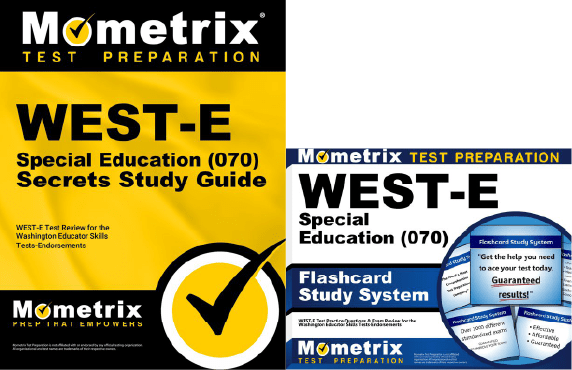If you need help studying for the WEST-E Special Education test or just want some more information about what the test is like, you’ve come to the right place!
Click below to take a free WEST-E Special Education practice test!
What’s on the Test?
The WEST-E Special Education test contains 110 multiple-choice questions, and you’ll be timed at 2 hours and 15 minutes.
Let’s take a closer look at each section of the exam:
1. Understanding Students with Disabilities
25% of the exam
- Human growth and development
- Characteristics and needs of students with disabilities
- Factors that affect learning and development of students with disabilities
2. Assessment and Program Development
25% of the exam
- Types and characteristics of assessments for students with disabilities
- Procedures for conducting assessments to address individual student needs
- Procedures for developing and implementing individualized programs
3. Promoting Development and Learning
25% of the exam
- Strategies for designing and managing learning environments
- Research-based strategies that promote positive academic outcomes for students with disabilities
- Research-based methods for promoting students’ adaptive, communication, and independent living skills
4. Foundations and Professional Practice
25% of the exam
- Historical, philosophical, and legal foundations in the education of individuals with disabilities
- Communicating and collaborating with others
- The professional responsibilities of the special education teacher
How to Register
To get started with the registration process, you’ll need to create an NES account on their website. You can then register for the exam via your account.
The testing fee is $96.
How the Exam is Scored
The WEST-E Special Education test is scored using a scaled scoring method. Here’s how it works:
For every question you answer correctly, you get one point added to your raw score. At the end of the test, your final raw score will be converted to a scaled score ranging from 100 to 300.
The reason your raw score is converted to a scaled score is because everyone that takes the test is given a slightly different set of questions. Since everyone has a different arrangement of questions, and because some questions are harder than others, converting your raw score to a scaled score ensures a more even playing field.
Retaking the Exam
If you don’t get the score you want on your first try, that’s okay! You can take the exam again after a mandatory 30-day waiting period.
FAQs
How many questions are on the WEST-E Special Education exam?
The exam contains 110 questions.
What is the time limit for the WEST-E Special Education exam?
The exam is timed at 2 hours and 15 minutes.
What is the passing score for the WEST-E Special Education exam?
You’ll need to get a final scaled score of at least 240 to pass.
How much does the WEST-E Special Education exam cost?
The testing fee is $96.



 WEST-E Study Guide
WEST-E Study Guide WEST-E Flashcards
WEST-E Flashcards